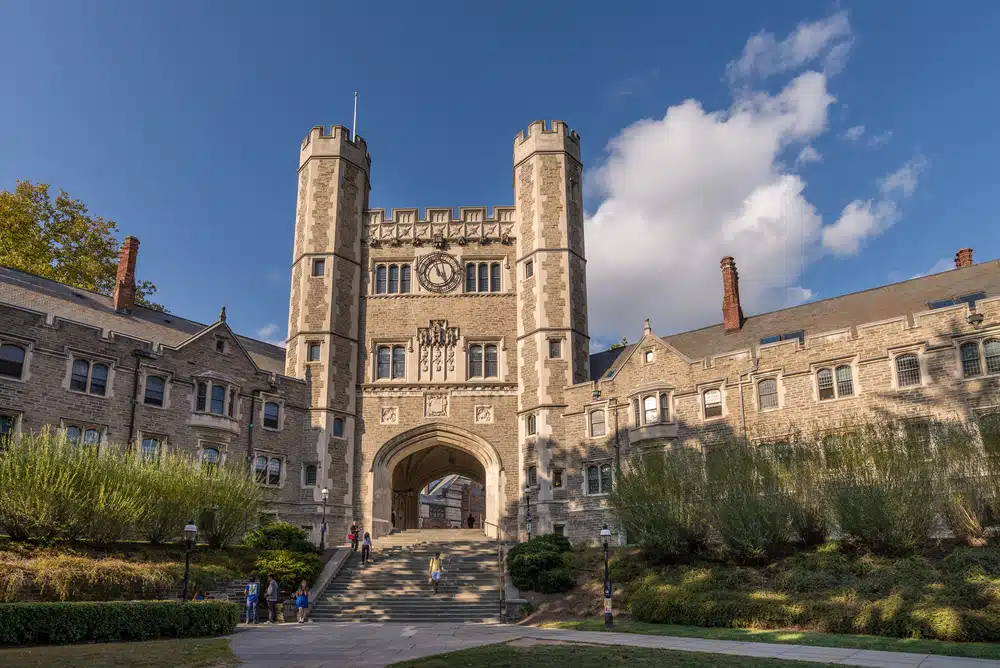What are the Best Majors at Princeton?
The best majors at Princeton are not merely subjects; they are comprehensive programs designed to challenge your intellect, nurture your skills, and prepare you for a lifetime of success.
Known for its academic rigor, groundbreaking research, and a long history of producing leaders in various fields, Princeton is not just any university—it’s a breeding ground for excellence.
This article explores the best majors at Princeton and how they can align with your career aspirations and personal passions.
Why is Picking a Major at Princeton So Crucial?
Choosing a major is akin to laying the first brick of your career’s foundation. At Princeton, this choice is even more critical given the university’s reputation for academic excellence and its influence on various industries.
The best majors at Princeton are not just about prestige; they are about aligning your educational journey with your long-term goals. Whether you’re eyeing Wall Street, Silicon Valley, or the corridors of political power, your major serves as a launchpad, propelling you into a trajectory that could define the rest of your life.
The stakes are high, but so are the rewards. Choosing the right major can open doors to internships, research opportunities, and a network of alums who can guide you long after you’ve left the hallowed halls of Princeton.
The weight of your decision: How your major can shape your future
Let’s delve deeper into the importance of your decision. Your major doesn’t just dictate what classes you’ll take; it shapes your worldview, hones your skills, and even influences your social circle.
The best majors at Princeton offer a holistic education, one that goes beyond textbooks and lectures. They prepare you for the real world, equipping you with the analytical skills to solve complex problems, the eloquence to articulate your ideas, and the resilience to navigate challenges.
Your major can be the difference between a job and a career, between being a professional and an expert. It’s a commitment to a field of study and a lifetime of learning and growth.
Therefore, choosing your major is not to be taken lightly; it’s a decision that echoes into your future, shaping not just what you do but who you become.
Princeton’s unique academic structure and its impact on your major
Princeton’s educational system is uniquely designed to offer students both breadth and depth. Unlike many universities where general education requirements can feel like an afterthought, Princeton integrates them seamlessly into its curriculum.
This allows you to explore various disciplines before committing to a major, giving you a well-rounded education that enriches your chosen field of study. The best majors at Princeton are structured to offer specialization and versatility, preparing you for a dynamic job market that values adaptability and a diverse skill set.
Furthermore, Princeton’s emphasis on undergraduate research means that regardless of your major, you’ll have the opportunity to delve into original projects guided by some of the world’s leading experts.
This hands-on experience is invaluable, providing real-world applications for theoretical knowledge and setting Princeton majors apart in academia and industry.
Best majors at Princeton
To claim a specific major as the “best” would be a disservice to the wide-ranging excellence exhibited across disciplines. However, some majors have historically gained recognition due to the university’s notable faculty, impactful research, and illustrious alums. Here’s a look at a few such majors at Princeton:

Public and International Affairs
With the renowned Princeton School of Public and International Affairs at its helm, the university has long been a hub for aspiring diplomats, policymakers, and international experts. The program’s interdisciplinary approach combines history, political science, economics, and other fields to produce well-rounded graduates who impact global policy and governance.
Computer Science
With the tech industry’s explosive growth, Computer Science at Princeton has garnered significant attention. A robust curriculum, cutting-edge research opportunities, and a history of notable alums such as Alan Turing distinguish their program. Students are exposed to the theoretical underpinnings of computation and its applications in various fields, from biology to economics.
Physics
Princeton’s Physics department is world-renowned. Alums and faculty have contributed groundbreaking research in quantum mechanics, particle physics, and astrophysics. The university’s association with the Institute for Advanced Study (where Einstein worked) further enhances its reputation in the field.
Molecular Biology
Princeton has consistently been at the forefront of research in molecular biology. The Lewis-Sigler Institute for Integrative Genomics at Princeton is a testament to its dedication to interdisciplinary approaches to understanding biological phenomena. Here, biology converges with physics, computer science, and engineering.
Mathematics
Home to some of the brightest minds in the field, Princeton’s Math majors are known for their rigorous programs and research initiatives. John Nash, a Nobel laureate and the subject of the film “A Beautiful Mind,” is one of the department’s legendary alumni.
Humanities
While STEM fields receive much attention, Princeton’s strength in the Humanities is undeniable. Their English, History, and Philosophy programs have been led by some of the most respected scholars in the world. The Humanities Council at Princeton champions interdisciplinary studies, bringing together literature, arts, history, and more, offering students a diverse and enriched educational experience.
Economics
With several Nobel laureates affiliated with the department, Economics at Princeton is highly respected. The program delves deep into various branches of economics, with specializations available in areas like behavioral economics, econometrics, and international economics.
Choosing a major, especially at an institution like Princeton, should be driven by passion and curiosity rather than solely by reputation. While the programs above have historically received acclaim, every department at Princeton offers academic rigor, exceptional faculty, and ample opportunities for research and exploration.
Ultimately, the “best” major aligns with a student’s personal and professional goals, and Princeton’s diverse academic offerings ensure that every student can find a program that fits their unique aspirations.
How Do You Decide on Your Major?
As you choose among the best majors at Princeton, one of the most critical choices a high school or college student must make is selecting a concentration of study. It is one that many people wish they could retake; according to one survey, 61% of college graduates would switch majors if they could return to school.

However, not everyone suffers from a case of buyer’s remorse when they receive their diploma. Before deciding on a major, you should consider the most significant considerations.
Consider Your Skills
Create a list of your accomplishments and areas of interest to get started. After you’ve finished, inquire with your closest loved ones and friends about what they would say about you. Sometimes, we need a third party to point out the qualities and abilities we sometimes take for granted.
Include any subjects that have always piqued your curiosity but that you’ve never committed to studying in depth. You should also mention things you used to be good at but haven’t done in a while, especially if you haven’t done them.
Investigate Possible Professions
When you have a list of your interests and passions, the next step is to investigate what kinds of professions meet those interests. For instance, if you have a passion for music, you could pursue a career as a music instructor or a club promoter or look for work at a charity organization dedicated to music.

After compiling a list of possible employment lines, you should consider observing those currently employed in those positions to get a feel for what it’s like to do the job. Following the processes that people carry out will help you determine whether or not you are engaged in the endeavor. If seeing someone on the job isn’t possible, you can contact folks via email or LinkedIn and set up a phone call to ask them questions.
Estimate Future Earnings
Most careers have their progression tracked by the Bureau of Labor Statistics. Visit the site and choose the professional fields that interest you most. You will be able to discover what employment is available in each sector from that location.
After compiling a list of occupations that pique your interest, you can use the site to determine which fields have a positive growth rate and incomes commensurate with the lifestyle you intend to lead. Even if the amount of money you will make in the future is not the only thing you should consider while choosing a career path, it is still essential. Having this knowledge can assist you in determining how much of an investment it is prudent to make in your secondary schooling.
Consider what you want your life to be like once you graduate from college. For example, if you want to establish a family, reside in a major city, or do substantial traveling, you will need a career that pays well enough to afford those things.
Consider how much of your time you can invest in your studies
It’s not true that all majors are created equal. There is a significant difference in the effort required for various programs. Think about how much time you can devote to your training and how committed you want to be as a student.
Research any advanced degrees you may require after you graduate college if you want to work in the field that interests you. Before you decide on what you want to study for your bachelor’s degree, it is essential to consider whether or not you will need to move on to earn a professional or master’s degree to achieve the professional goals you have set for yourself.
What Kind of Students Does Princeton Look for?
Most students have a positive experience at Princeton, as evidenced by the fact that 98% of first-year students choose to continue their education there. This high proportion indicates that most undergraduate students are very content with their academic and social experiences, and most students share this feeling.

The close-knit community vibe in this neighborhood may have something to do with it. All first-year and second-year students are expected to live on campus at Princeton. Because housing is guaranteed for all four years of the undergraduate experience, an astounding 94% of students choose to do so.
The educational opportunities available at Princeton University are extensive. There are 36 different majors at Princeton University (with computer science available as both a Bachelor of Arts and a Bachelor of Science in Engineering). These degrees cover various subjects, from anthropology and literature to physics and engineering and everything in between. The social sciences, engineering, computer science, and biology are some of the most popular choices for undergraduate degrees.
In addition, Princeton offers 55 different undergraduate interdisciplinary certificate programs, similar to minors, in that they complement your major and allow you to develop expertise in another discipline.
Another prominent aspect of Princeton is its tiny class sizes: the student-faculty ratio is just 5:1, meaning there are only five students per professor. This percentage assures that your teachers will devote sufficient time and attention to each student individually.
Students who have pursued academic distinction and have a healthy intellectual curiosity are ideal candidates for admission to Princeton. They are looking for kids who have excelled in their personal lives and extracurricular activities. In addition, students who attend Princeton are both self-motivated and hard-working. If you are the type of student who values these qualities, you might consider applying to Princeton. It is an excellent opportunity for anyone interested in cooperating with other students while expanding their academic horizons.
What are Your Chances of Getting Into Princeton?
The university’s class of 2025 had an acceptance rate that was a record low of 3.98%, which meant that it only granted admission to 1,498 students out of the 37,601 applications it received. All applications were through the standard determination procedure, as early action applications were suspended for this admissions session.

As Princeton is known globally for many of its best majors, you should know that the admissions process for the class of 2025 was made even more difficult because the total number of students accepted was almost 20% fewer than usual. This was caused by more than 200 students in the class of 2024 chose to postpone their enrollment. The strength of your profile is the most critical factor in determining whether or not you will get accepted into Princeton, which is consistently ranked as one of the most competitive institutions in the country.
Even while the admissions process at Princeton takes a more comprehensive approach, most students must still finish at the top of their high school classes and receive scores that are very close to flawless on standardized exams to be considered. Because academic performance is the first factor that admissions staff look at, your high school transcript is the component of your application that bears the most weight.
The admissions committee at Princeton will consider what you have accomplished inside and outside the classroom. Because of this, your extracurricular activities are pretty significant. They are interested in learning about your skills, accomplishments in your personal life, and academic achievements. If you participate in extracurricular activities you are intensely interested in, that enthusiasm will come over in your application.
In addition, applicants who have demonstrated a commitment to improving their high schools and communities will stand out. When you talk about your leadership activities, interests, and talents that set you apart from other applicants, you show the admissions committee how much you care about your commitments and what you’ve done due to those commitments.
Lastly, Princeton is interested in knowing how you intend to contribute to the community of Princeton by using the academic and extracurricular possibilities available at the school. Your application should have a list of accomplishments, and your writing should highlight your voice.
Suppose you need help choosing among the best majors at Princeton or help putting the finishing touches on your college applications at AdmissionSight. In that case, we have over ten years of experience guiding students through competitive admissions.
AdmissionSight can help you put your best foot forward when applying to college this fall. Contact us today for more information on our services.



































